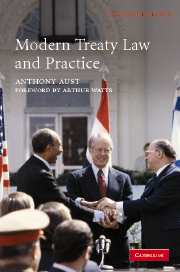Book contents
- Frontmatter
- Contents
- Foreword to the first edition by Sir Arthur Watts
- Preface to the second edition
- Articles of the Convention cited in the text
- Table of treaties
- Table of MOUs
- Table of cases
- Glossary of legal terms
- List of abbreviations
- Introduction
- 1 Vienna Convention on the Law of Treaties 1969
- 2 What is a treaty?
- 3 MOUs
- 4 Capacity to conclude treaties
- 5 Full powers
- 6 Adoption and authentication
- 7 Consent to be bound
- 8 Reservations
- 9 Entry into force
- 10 Treaties and domestic law
- 11 Territorial application
- 12 Successive treaties
- 13 Interpretation
- 14 Third states
- 15 Amendment
- 16 Duration and termination
- 17 Invalidity
- 18 The depositary
- 19 Registration and publication
- 20 Dispute settlement and remedies
- 21 Succession to treaties
- 22 International Organisations
- 23 Drafting and final clauses
- Appendices
- Index
3 - MOUs
- Frontmatter
- Contents
- Foreword to the first edition by Sir Arthur Watts
- Preface to the second edition
- Articles of the Convention cited in the text
- Table of treaties
- Table of MOUs
- Table of cases
- Glossary of legal terms
- List of abbreviations
- Introduction
- 1 Vienna Convention on the Law of Treaties 1969
- 2 What is a treaty?
- 3 MOUs
- 4 Capacity to conclude treaties
- 5 Full powers
- 6 Adoption and authentication
- 7 Consent to be bound
- 8 Reservations
- 9 Entry into force
- 10 Treaties and domestic law
- 11 Territorial application
- 12 Successive treaties
- 13 Interpretation
- 14 Third states
- 15 Amendment
- 16 Duration and termination
- 17 Invalidity
- 18 The depositary
- 19 Registration and publication
- 20 Dispute settlement and remedies
- 21 Succession to treaties
- 22 International Organisations
- 23 Drafting and final clauses
- Appendices
- Index
Summary
Open covenants of peace, openly arrived at, after which there shall be no private international understandings of any kind, but diplomacy shall proceed always frankly and in the public view.
Since President Woodrow Wilson issued this sincere, but unworldly, appeal in 1919, diplomacy has continued to develop many new ways of doing business. Diplomats know that it is impossible for all international deals, whether important or not, to be embodied in treaties, even when the matter is proper and lawful. Hence the relentless rise of the MOU. As described briefly in the previous chapter, an MOU is an instrument concluded between states which they do not intend to be governed by international law (or any other law) and, consequently, is not legally binding.
But first, a word of warning. Because the use of MOUs is now so widespread, some officials may see the MOU as the norm, a treaty being used only when it cannot be avoided. The very word ‘treaty’ may conjure up some of the more fearsome formalities of diplomacy. One of the tasks of legal advisers is to explain the differences between a treaty and an MOU, and why one might be preferable to the other. In general, unless there is a particular advantage in having an MOU, such as confidentiality, there should be no reason to avoid having a treaty. Equally, in principle, there is no reason to prefer a treaty to an MOU unless there is a need to create legally binding rights and obligations or, given the subject, there is a constitutional or other domestic legal requirement for a treaty.
- Type
- Chapter
- Information
- Modern Treaty Law and Practice , pp. 32 - 57Publisher: Cambridge University PressPrint publication year: 2007



